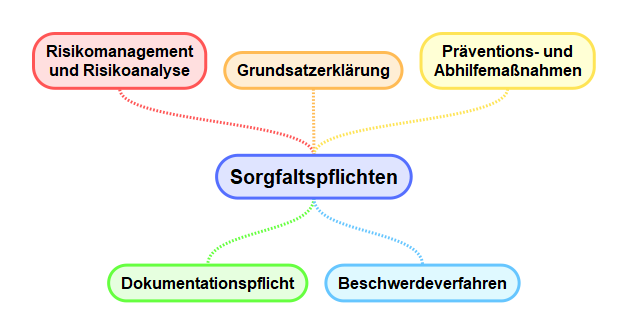Table of contents
- General information about the Due Diligence Act
- What are the objectives of the Due Diligence Act?
- Which companies will be affected by the Due Diligence Act?
- Supply chain definition
- What measures must companies now take with regard to corporate due diligence?
- Establishment of a risk management system (§ 4 (1))
- Determination of an in-house responsibility (§ 4 Paragraph 3)
- Carrying out regular risk analyses (§ 5)
- Adoption of a policy statement (§ 6(2))
- Anchoring of prevention measures in the company’s own business area (§ 6 (1) and (3)) and vis-à-vis direct suppliers (§ 6 (4)),
- Taking corrective action (§ 7 (1) to (3))
- Establishment of a complaints procedure (§ 8)
- Implementation of due diligence with regard to risks at indirect suppliers (§ 9)
- Documentation (§ 10 paragraph 1) and reporting (§ 10 paragraph 2)
- Evidence
General information about the Due Diligence Act
On Friday, June 11, 2021, the Bundestag adopted the German government’s draft law on corporate due diligence in supply chains (also known as the s Supply Chain Act) as amended by the Committee on Labor and Social Affairs.
On June 25, 2021, the Bundesrat approved the law. .“
What are the objectives of the Due Diligence Act?
The main goal of the law is to improve the human rights situation along supply chains worldwide and to make globalization social.
Which companies will be affected by the Due Diligence Act?
The „Act shall apply to companies, irrespective of their legal form, which have their head office, principal place of business, administrative headquarters or registered office in Germany and generally employ at least 3,000 employees. As of January 1, 2024, the threshold provided for in sentence 1, number 2, shall be 1,000 employees. „
Supply chain definition
„The supply chain […] refers to all products and services of a company. It includes all the steps at home and abroad that are required to manufacture the products and provide the services, starting with the extraction of the raw materials and ending with delivery to the end customer, and covers
- The actions of a company in its own business area,
- the actions of a direct supplier and
- the actions of an indirect supplier.“
What measures must companies now take with regard to corporate due diligence?
§Section 3 of the Act on Corporate Due Diligence to Prevent Human Rights Violations in Supply Chains (Due Diligence Act) requires companies to comply with human rights and environmental due diligence obligations.

This means in detail:
Establishment of a risk management system (§ 4 (1))
The company must „establish an appropriate and effective risk management system. Risk management shall be embedded in all relevant business processes through appropriate measures. „
This involves identifying human rights and environmental risks and eliminating or minimizing them.
Determination of an in-house responsibility (§ 4 Paragraph 3)
The responsibility for monitoring risk management – „for example, through the appointment of a human rights officer “ – must be made binding.
Carrying out regular risk analyses (§ 5)
„As part of risk management, the company shall conduct an appropriate risk analysis […] to identify the human rights and environmental risks in its own business operations and those of its direct suppliers. „
To this end, risks must be identified, prioritized, and documented, at least annually as well as on an event-driven basis. The risk analysis must be communicated to all „relevant decision maker[s] „.
Adoption of a policy statement (§ 6(2))
The company must adopt a policy statement on its human rights strategy. This must contain at least:
- A description of the process for complying with human rights and environmental due diligence requirements in the supply chain
- „the priority human rights and environmental risks identified for the company on the basis of the risk analysis“
- A definition of the human rights and environmental expectations of employees and suppliers (Code of Conduct)
Anchoring of prevention measures in the company’s own business area (§ 6 (1) and (3)) and vis-à-vis direct suppliers (§ 6 (4)),
„If a company identifies a risk in the course of a risk analysis pursuant to § 5, it shall immediately
take appropriate preventive measures […]. „
This can mean in detail:
- The development and implementation of appropriate procurement strategies and purchasing practices.
- Conducting training in the relevant business areas
- implementing risk-based monitoring measures to verify compliance with the human rights strategy contained in the policy statement in its own business unit
- taking into account human rights and environmental expectations when selecting a direct supplier
- Contractual assurances from a direct supplier that it will meet human rights and environmental expectations.
Furthermore, „the effectiveness of the preventive measures shall be reviewed once a year as well as on an ad hoc basis“ .
Taking corrective action (§ 7 (1) to (3))
If the company detects violations of the above obligations in its own business or at a direct supplier, it is obliged to „immediately “ take measures to remedy them.
Establishment of a complaints procedure (§ 8)
The company must establish internal grievance procedures that allow it to „highlight human rights and environmental risks or violations .“
This procedure must be documented in writing and its effectiveness reviewed at least once a year and on an ad hoc basis.
Implementation of due diligence with regard to risks at indirect suppliers (§ 9)
The complaints procedure to be set up in accordance with §8 must also be accessible to employees etc. of indirect suppliers.
Documentation (§ 10 paragraph 1) and reporting (§ 10 paragraph 2)
The entire procedure for complying with the obligations of the Act on Corporate Due Diligence to Prevent Human Rights Violations in Supply Chains (Due Diligence Act) must be documented. „The
documentation shall be retained for at least seven years from its creation .“
Furthermore, the company must prepare a report on the fulfillment of its due diligence obligations in the past fiscal year.

